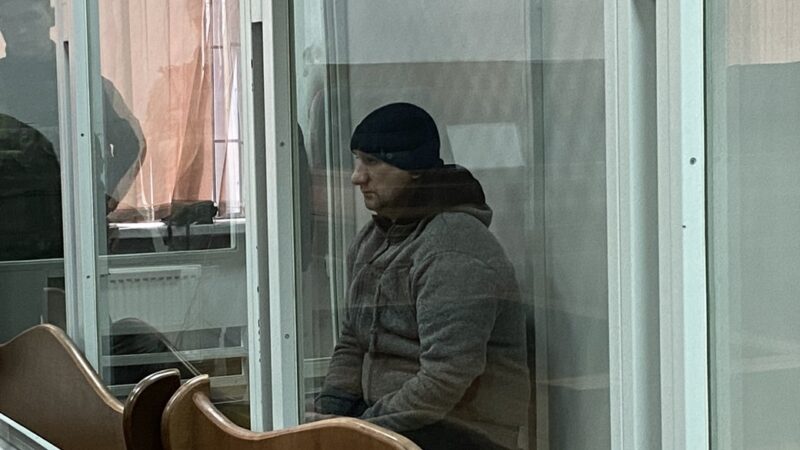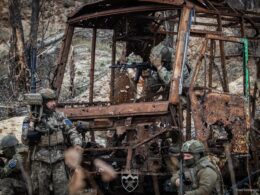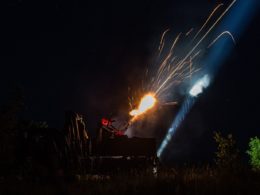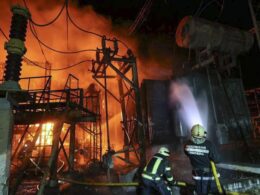When the former chief warden of the “Izolyatsia” prison, detained by Ukrainian law enforcement agencies, read a book written by his prisoner who had escaped from Russian captivity, he immediately denied committing atrocities against Ukrainian captives.
In the book, the journalist of Radio Free Europe/Radio Liberty, Stanislav Aseiev described how Denis Kulykovskyi, 39, took part in torturing Ukrainians under guidance from Russian occupation authorities in Donetsk Oblast.
Both civilians and soldiers, women and men, could become the prisoners of the notorious torture jail if Russian-installed leaders deemed them as “suspicious.”
Even after two years since he left his post at the “Izolyatsia,” which is often called a “concentration camp,” Denis Kulykovskiy refused to admit his guilt. At the recent court hearing that ordered 15 years in jail for the former Donetsk prison chief, he denied accusations of involvement in torturing Ukrainian prisoners, in a move that could potentially lower his imprisonment term, Suspilne informs.
The captives, including Aseiev, who have returned to Ukrainian-controlled territory still struggle to recover. He recalls that victims of the prison were beaten and strangled, subjected to psychological abuse and and electric shock torture.
The writer and journalist also says women in the “Izolyatsia” were sexually abused by Kulykovskiy himself. In addition, the chief warden gave orders to prisoners to sexually assault each other and instructed guards to harm babies born in the prison.
Stanislav Pechonkin, a former prisoner of the Izoliatsia, said that he and his cellmates were once forced to sing for Kulikovskiy on his birthday, were beaten, and nearly escaped execution when the drunken warden ordered them shot, RFE/RL reports.
“My cellmates were taken out so that we could entertain those who were celebrating and sing songs for them. All this turned into a beating, and then [Kulykovskyi] and those who were with him – they were all already quite drunk – ordered the guard to shoot us,” Pechonkin said. He added they were saved by a sober guard, who led them back to their cell.
On 3 January, the Kyiv court sentenced Kulykovskyi to 15 years in prison. However, as the chief warden of the Donetsk torture jail already spent four years in Ukraine’s pre–detention center, he will stay in prison for 11 years.
The decision has sparked outrage among former captives and victims of the secret “concentration camp.”
“Fifteen years for such a person is an unjust sentence because he should have received a life sentence. He is a classic psychopath and sadist, and releasing him into society is not an option,” said Aseiev.
Ukraine’s Prosecutor-General’s Office formally declared Kulykovskiy a suspect in December 2020. He had been put on a wanted list for atrocities committed in the Donbas. The authorities claimed he had been residing in occupied territories or Russia.
Contrary to this assumption, Kulykovskyi relocated to Kyiv in 2019 after reportedly cooperating with the Ukrainian Security Service (SBU) on a counterintelligence operation. Former SBU officers, speaking anonymously with RFE/RL and Bellingcat, disclosed this information, claiming Kulykovskyi provided valuable details about Russian soldiers and collaborators in Donetsk Oblast.
Kulykovskyi was arrested on 9 November 2021, after an investigation by Stanislav Aseiev and Christo Grozev. He faced charges of “taking part in killings and torture of illegally held Ukrainian citizens.”
Following Kulykovskyi’s arrest, the Kremlin-backed forces controlling Donetsk declared him wanted on charges of treason, torture, and murder. The exact number of people held at Izolyatsia, believed to be still in operation, remains unknown.
Read more here:
- Ukraine detains warden of concentration camp of Russian-occupied Donetsk
- Three warders who tortured prisoners in occupied Donbas “concentration camp” ID’d as Russian citizens
- First public photos of Russian-run Donetsk concentration camp leaked online
- BBC: How the “DNR” special services & troll factory scare Russians with terror attacks
- Is sexual violence used as a weapon in the Donbas War?
- Donetsk art center turned into concentration camp: former hostages share their memories
- Displaced art. The IZOLYATSIA art center, having fled occupied Donetsk, flourishes in Kyiv






